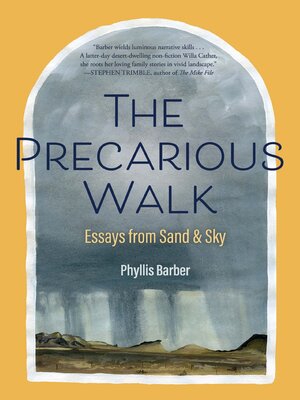
Sign up to save your library
With an OverDrive account, you can save your favorite libraries for at-a-glance information about availability. Find out more about OverDrive accounts.
Find this title in Libby, the library reading app by OverDrive.



Search for a digital library with this title
Title found at these libraries:
| Library Name | Distance |
|---|---|
| Loading... |
In wide-ranging personal essays at the crossroads of place and perspective, Phyllis Barber challenges and celebrates her Great Basin roots.
From a backwoods church in Arkansas to the disappeared town of St. Thomas, buried beneath the waters of Lake Mead, award-winning essayist Phyllis Barber travels roads both internal and external, reflecting upon place and perspective, ambition and loss in The Precarious Walk. As a child growing up in the Mojave Desert, she witnesses the massive power of the Hoover Dam and a fiery rip in the sky from the Nevada Test Site. As an adult, Barber searches for meaning through music, movement, and human connection, examining her Mormon upbringing, the profound ways people and landscape impact one another, and the sudden loss of her first child with open-ended honesty.
Barber's distinctly feminine voice expands upon the literature of the West alongside Ellen Meloy and Terry Tempest Williams, with seeking and questioning at the heart of this deeply felt collection. In the spirit of Flannery O'Connor and David James Duncan, Barber adds a deeply generous and—true to her high–desert roots—down-to-earth voice to the illumination of human experience.
From a backwoods church in Arkansas to the disappeared town of St. Thomas, buried beneath the waters of Lake Mead, award-winning essayist Phyllis Barber travels roads both internal and external, reflecting upon place and perspective, ambition and loss in The Precarious Walk. As a child growing up in the Mojave Desert, she witnesses the massive power of the Hoover Dam and a fiery rip in the sky from the Nevada Test Site. As an adult, Barber searches for meaning through music, movement, and human connection, examining her Mormon upbringing, the profound ways people and landscape impact one another, and the sudden loss of her first child with open-ended honesty.
Barber's distinctly feminine voice expands upon the literature of the West alongside Ellen Meloy and Terry Tempest Williams, with seeking and questioning at the heart of this deeply felt collection. In the spirit of Flannery O'Connor and David James Duncan, Barber adds a deeply generous and—true to her high–desert roots—down-to-earth voice to the illumination of human experience.







